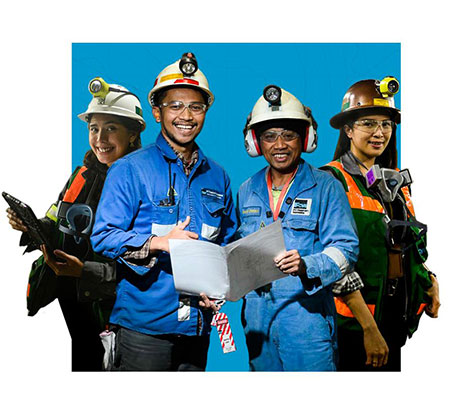PTFI and YPMAK continue to promote economic growth that will generate income for the local community by leveraging competitive strength of each particular area. In doing so, PTFI and YPMAK also encourage other stakeholders to participate in the regional and community development in economic sector. PTFI and YPMAK focus its economic development programs on fisheries, animal husbandry, agriculture, food security programs, economy system support and alternative economy programs, as well as cooperation with other parties.
Fisheries Program
The fishing program initiated by PTFI in 2002, has involved the YPMAK mainly in funds support and assistance through continuation of cooperation agreement between PTFI, YPMAK and AMARTA-USAID, and the Maria Bintang Laut Cooperative (KMBL) from the Timika Diocese as the program manager.
Animal Husbandry Program
In 2011, the animal husbandry program focused on continuing the transfer of knowledge and technology and on reinforcing the cooperation and synergy among programs already running. The synergy emerged from the increased cooperation between the Jayasakti Mandiri Foundation (Yayasan Jayasakti Mandiri/YJM) as the manager of the animal husbandry program in two villages in the lowland area (Wangirja-SP IX and Utikini Baru-SP XII) and the manager of the Rural Income Generating Activities (RIGA) program run by YPMAK.
In addition to programs in the lowlands, YPMAK and YJM also support the development of animal husbandry program in the highlands (Tsinga, Banti, and Aroanop).
Agriculture and Food Security Program
Facilitation in the agriculture program is intended to transfer knowledge to the local communities in the crop plants cultivation, particularly those having a commercial value by maximizing the use of the land around their homes. The activities covered by the agricultural program were:
Sago Plantation Program. A program to develop sago hamlets (plantation) in Nayaro village is an initial effort to achieve food security based on the local wisdom and character. In addition to achieving food security, the development of sago farms was expected to provide economic benefits for the local communities in the future.
Lowland Agriculture Program. In the Kamoro villages, YPMAK developed a program for the communities to use their own yards to plant various horticultures such as vegetables, fruits, and yams. There were around 179 families in the five villages of Kamoro and 24 families in SP IX and SP XII who were actively involved in agricultural activities and thus able to generate extra income or become alternative food source.
Highland Coffee Agro-forestry and Horticulture Program. Program of the economic development for Amungme communities in the highlands kept focusing on promoting the indigenous coffee farmers and assisting them in the cultivation of horticultural and food crops.
PTFI through the Highland Agriculture Development (HAD) program – previously called as the Amungme Agroforestry (AAF) program –has opened a coffee plantation in the highland area since 1998. Up to the end of 2011, the number of farmers actively involved in coffee farming consisted of 77 farmers from the districts of Tsinga, Hoea, and Aroanop (22 assisted farmers and 55 independent farmers).
This program is aimed at supporting people-centered economic development through utilization of natural resources potential around them. The program optimizes a combination of inherent abilities and local wisdom.
PTFI and YPMAK continue to spur economic growth that provides added value for the local community through stimulation of competitive advantages in each region. In playing this role, PTFI and YPMAK engage other stakeholders in developing the economy of their region and community. Under this development, PTFI and YPMAK focus on programs on fishery, livestock breeding, farming, food security, support for alternative economic systems and economic programs, as well as engage in collaboration with other parties.
The program for Development of Micro, Small and Medium Businesses (Usaha Mikro, Kecil dan Menengah /PP-UMKM) and the Revolving Fund are aimed at developing local economic activities through provision of mentoring and accompaniment for Papuan entrepreneurs with potential. These programs are expected to boost the economies and standard of living of local communities in a sustainable manner, and build the capacities of local businesses to engage in market competition.
The Revolving Fund Program is managed by the Bina Utama Mandiri Foundation (Yayasan Bina Utama Mandiri/YBUM). The foundation is responsible to disburse loans in form of revolving funds to the local entrepreneurs who were not eligible to take a loan from the banks. Through the revolving fund program, local entrepreneurs also obtained education and knowledge about the partnership system with the bank. Hence, they would understand the procedure and requirement for requesting funds (credit) from the bank or other formal financial institutions.
Kami menghimbau para pencari kerja untuk berhati-hati dan mewaspadai beragam modus penipuan perekrutan yang mengatasnamakan PT Freeport Indonesia. Dalam setiap proses rekrutmen dan penerimaan karyawan, PT Freeport Indonesia maupun konsultan rekruitmennya tidak memungut biaya apapun.
Untuk melihat lowongan, silakan akses melalui link berikut: ptfi e-recruitment
Untuk melihat informasi magang, silakan akses melalui link berikut: Internship Program
